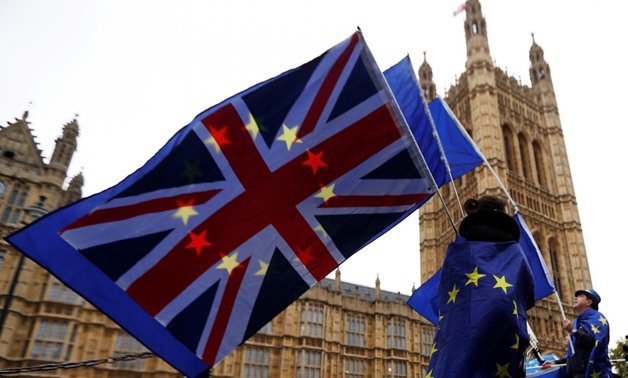
Anti-Brexit protesters wave EU and Union flags outside the Houses of Parliament in London, Britain, November 14, 2017. REUTERS/Peter Nicholls
BRUSSELS - 23 January 2018: The European Parliament should be cut in size after Britain leaves the bloc and some lawmakers should be elected on pan-EU tickets, senior members said on Tuesday.
In elections in May 2019, two months after Brexit, the number of seats in the legislature should be cut from from 751 to 705, an influential committee of MEPs said in a report.
Britain currently has 73 seats, of which some should be shared out among remaining countries, and the rest held for planned pan-EU lists of lawmakers who do not represent individual nations, it said.
Danuta Huebner, the Polish lawmaker responsible for the report, said they had been "able to achieve a key success, namely to reduce the size of the European Parliament."
"This will make our institution leaner whilst ensuring its political operability."
EU national leaders are set to discuss the proposals at a summit in February, with a final decision in June. Any decision would then have to be ratified by the remaining 27 states in the union.
The report by the European Parliament's constitutional affairs committee said 27 seats will be shared out among 14 remaining EU countries "that are currently slightly under-represented."
- 'Pan-European lists' -
France and Spain would be the biggest winners with five more seats, while Italy would get three.
EU countries receive a number of seats in the parliament -- the bloc's only directly elected body -- that is roughly proportionate to their population, meaning Germany and France have the most, and Malta and Luxembourg the fewest.
Thirty of the 73 British seats should be kept in reserve for "possible pan-European lists", the report said.
"Introducing such a transnational constituency would strengthen the sense of EU citizenship and the European character of elections to parliament," the European Parliament said in a statement.
The remaining 16 will be held for new countries that may join the EU in future -- a number of countries including Turkey, Montenegro and Serbia have applied for accession to the bloc although Brussels has ruled out any enlargement until after 2020.
The next European elections are expected to take place on May 23-26, 2019.
The European Parliament has the final say over all EU law -- including the upcoming Brexit deal.
But unlike national parliaments it cannot propose laws, that task being left to the European Commission, the bloc's powerful executive arm headed by Jean-Claude Juncker, and the European Council, which groups national leaders.
The parliament holds near-monthly sessions in the eastern French city of Strasbourg and also meets regularly in Brussels, with the expense of having to move between the two sites being a frequent target of eurosceptic ire.

Comments
Leave a Comment